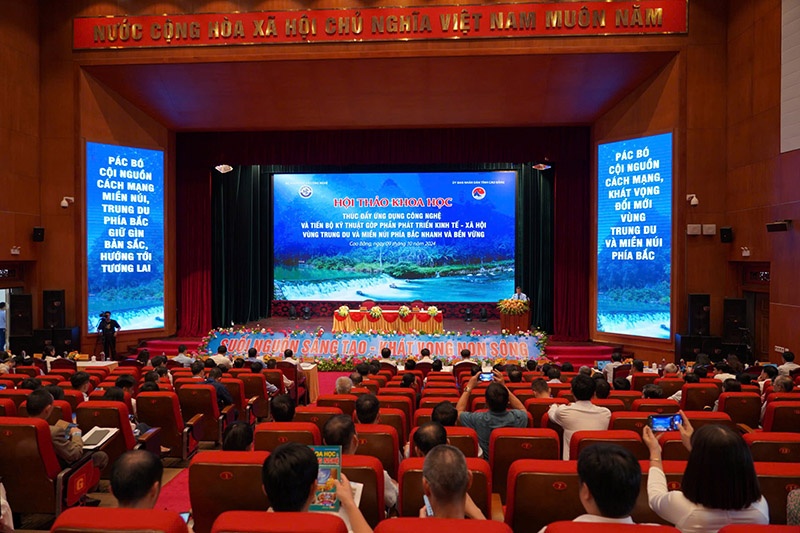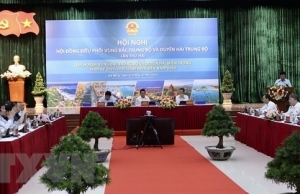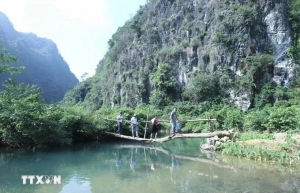Ensuring technological progress in northern midlands and mountainous regions
 |
| Photo: Ministry of Science and Technology |
At the workshop, representatives from central and local management and research agencies discussed practical solutions for each locality; focused on solutions to promote regional and intra-regional linkages; discussed policies to promote science, technology, and innovation; and looked at the development of startup and innovation ecosystems.
The Institute for Regional Research and Development under the MoST proposed several solutions regarding technology application for the region's rapid and sustainable development.
Solutions for innovating management and developing science and technology in the northern midlands and mountainous region need to be implemented comprehensively and synchronously, according to MoST.
Specifically, localities in the region need to reform their provincial-level sci-tech task ordering mechanisms through developing long-term development programmes and plans spanning 3-5 years. A critical focus must be placed on enhancing sci-tech councils through strategic decentralisation and precise delegation of authority, while intensifying the training of specialised personnel and capacity-building initiatives for officials at commune and district levels.
Alongside these efforts, substantial investment in sci-tech sectors must be prioritised, particularly in research projects designed to harness the region's inherent potential and competitive advantages, ensuring that science, technology, and innovation play a more pronounced role in driving socioeconomic advancement while maintaining robust defence and security measures throughout the region.
Speaking at the workshop, Minister of Science and Technology Huynh Thanh Dat said, “The northern midlands and mountainous region is strategically crucial for socioeconomic development, national defence, security, and foreign relations. The region plays a decisive role in the ecological environment of the entire northern region and has potential advantages in agriculture, forestry, hydropower, mining, tourism, and border gate economics.”
 |
| Minister of Science and Technology Huynh Thanh Dat spoke at the event. Photo: Ministry of Science and Technology |
However, this region still faces the most difficulties nationwide, with weak regional linkages and unrealised potential, particularly in border economics with neighbouring Laos and China. The development gap and average per capita income compared to the national average continue to widen, affecting the region's socioeconomic development results.
The minister emphasised that during 2022-2024, despite global and regional challenges, under the close leadership of the Party and State and the government's decisive management, the region's economy has shown positive recovery. Many growth targets have exceeded plans, with significant contributions from local science, technology, and innovation activities.
At the workshop, Hoang Xuan Anh, Chairman of Cao Bang People's Committee said, “Local authorities have been focusing on implementing policies and solutions to promote scientific and technological applications in socioeconomic development, contributing to productivity improvement and economic competitiveness.”
To date, the province has implemented 11 sci-tech projects with a total investment of nearly $3.2 million. The province has also approved 37 new research projects with a total funding of nearly $2 million. Results from 18 projects have been transferred to 61 local organisations, institutions, and individuals for continued application and expansion into practical implementation.
He noted that besides achievements, Cao Bang and other provinces in the region regularly face natural disasters and climate change impacts. In the past two months, several localities, including Cao Bang, suffered severe human and property losses due to floods and Typhoon Yagi.
Anh requested research agencies and scientists to study technological solutions for surveying and forecasting natural disaster impacts and climate change, to develop timely and effective response plans, minimise disaster risks, and create foundations for rapid and sustainable local development.
 | Pernod Ricard supports northern regions affected by Typhoon Yagi Pernod Ricard Vietnam Co., Ltd. donated VND1 billion ($41,600) to Vietnam Fatherland Front on September 25 to support northern localities severely impacted by Typhoon Yagi. |
 | Planning for north-central, central coastal regions puts forth new, breakthrough proposals The planning for the north-central and central coastal region for 2021-2030, with a vision to 2050, has introduced new and innovative insights and proposals based on the region's advantages and strengths, said Minister of Planning and Investment Nguyen Chi Dung at a conference held in Da Nang on October 11. |
 | Mountainous areas need more foreign investment to thrive Aside from harnessing domestic resources, it is important to attract foreign investment to optimise potential and advantages of ethnic minority and mountainous areas, according to experts. |
What the stars mean:
★ Poor ★ ★ Promising ★★★ Good ★★★★ Very good ★★★★★ Exceptional
Related Contents
Latest News
More News
- Agentic AI set to reshape Vietnam’s enterprise landscape (February 10, 2026 | 12:06)
- Agro-forestry and fisheries exports jump nearly 30 per cent in January (February 09, 2026 | 17:45)
- Canada trade minister to visit Vietnam and Singapore (February 09, 2026 | 17:37)
- New tax incentives to benefit startups and SMEs (February 09, 2026 | 17:27)
- Vietnam forest protection initiative launched (February 07, 2026 | 09:00)
- China buys $1.5bn of Vietnam farm produce in early 2026 (February 06, 2026 | 20:00)
- Vietnam-South Africa strategic partnership boosts business links (February 06, 2026 | 13:28)
- Mondelez Kinh Do renews the spirit of togetherness (February 06, 2026 | 09:35)
- Seafood exports rise in January (February 05, 2026 | 17:31)
- Accelerating digitalisation of air traffic services in Vietnam (February 05, 2026 | 17:30)

 Tag:
Tag:




















 Mobile Version
Mobile Version